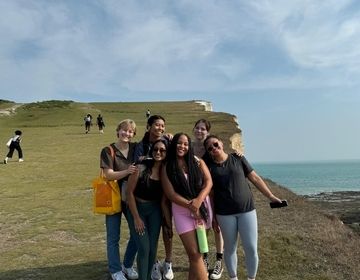Top 18 Study Abroad Tips
As you prepare for the study abroad adventure of a lifetime, consider our inside study abroad tips to make your experience smoother.
If you're looking for study abroad tips and advice, you've come to the right place! Follow along as we break down our tips for studying abroad into five categories: Study abroad application tips, study abroad essay tips, studying abroad packing tips, safety tips, and even a few pointers once you’re on program.
Read More: Your Study Abroad FAQs [Answered!]
Study Abroad Application Tips
Our CIEE study abroad application is pretty straightforward. You can even watch a few of our application FAQ videos to help you with the process.
Here, we’ve highlighted a few key tips when filling out your application.
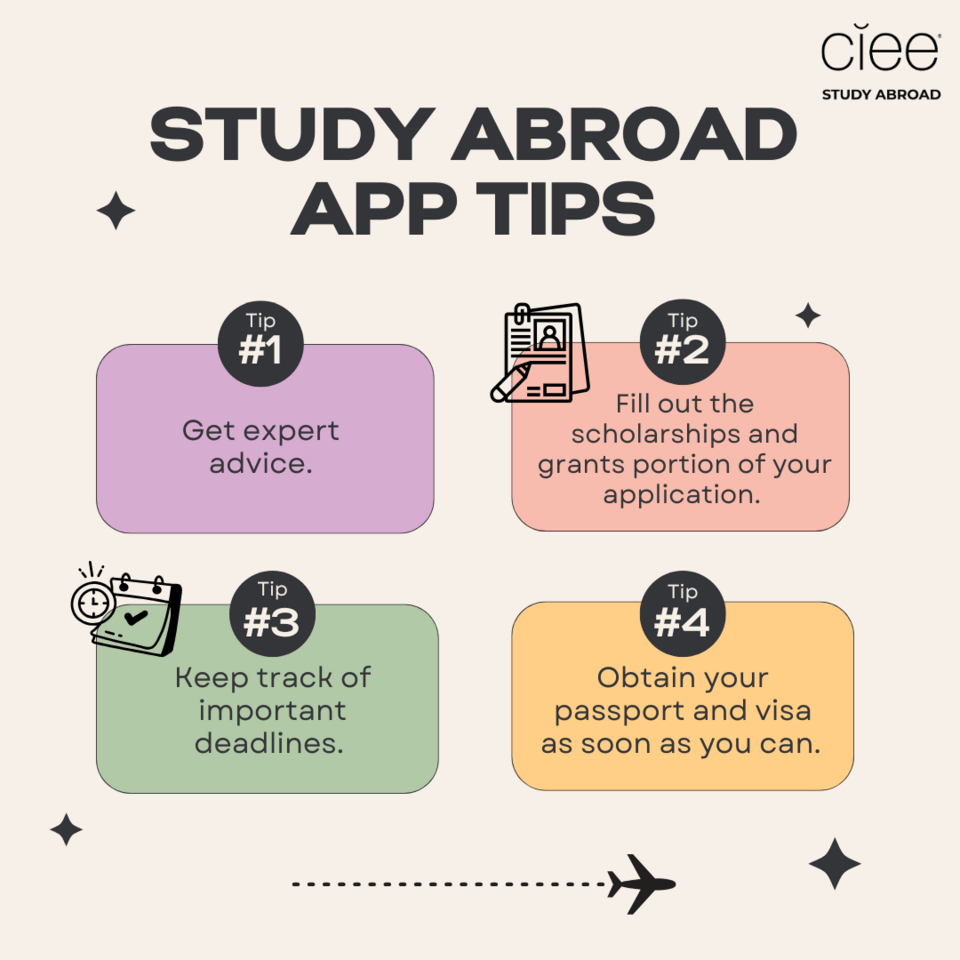
Tip #1: Get expert advice.
Before you start your study abroad application, it’s a good idea to check in with your school’s study abroad office and academic advisor to ensure your study abroad plans align with your academic goals and discuss any additional details. They might even offer some of their own tips for studying abroad!
Tip #2: Fill out the scholarships and grants portion of your application.
To assist with the cost of your study abroad program, pay close attention to the scholarships and grants portion of your application. We break down our scholarships and grants into three categories:
- Need-Based: Offered to students with demonstrated financial need
- Merit-Based: Offered to students with strong academic achievement
- Other: Offered to students based on alumni status or specific program choice
See what type of financial support you may be eligible for!
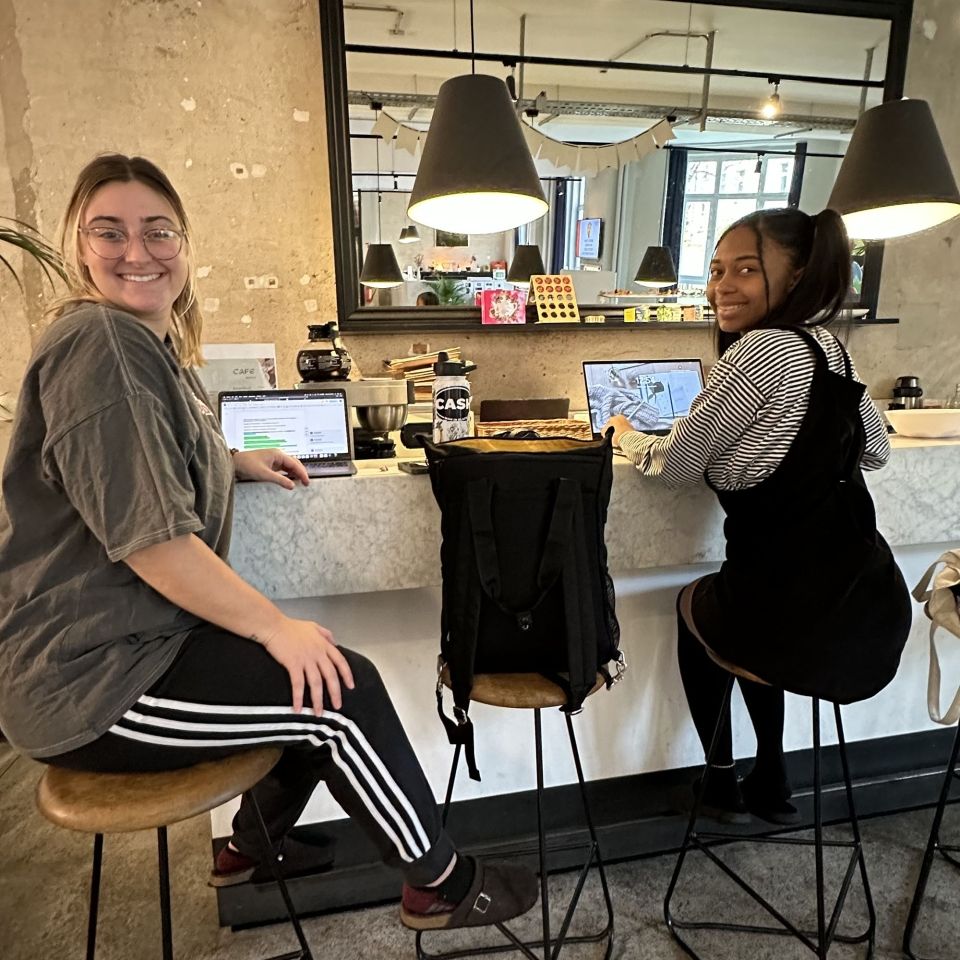
Read More: Study Abroad Scholarships: Everything You Need to Know
Tip #3: Keep track of important deadlines.
This is one of our most important study abroad tips: Stay organized throughout the application process; including keeping track of important deadlines. Depending on the study abroad program you choose, your deadlines will vary. Mark them on a calendar, schedule reminders on your phone, and do whatever else to help ensure you fill out your application on time!
And if you have any questions, feel free to contact us. We’re happy to help.
Tip #4: Obtain your passport and visa as soon as you can.
If you don’t already have your passport when you start your CIEE study abroad application, take the necessary steps to get one, or renew an existing one as soon as possible. And depending on the length of your study abroad program, you’ll likely need a visa as well. We recommend having your passport and visa in hand six to nine months before you take flight.
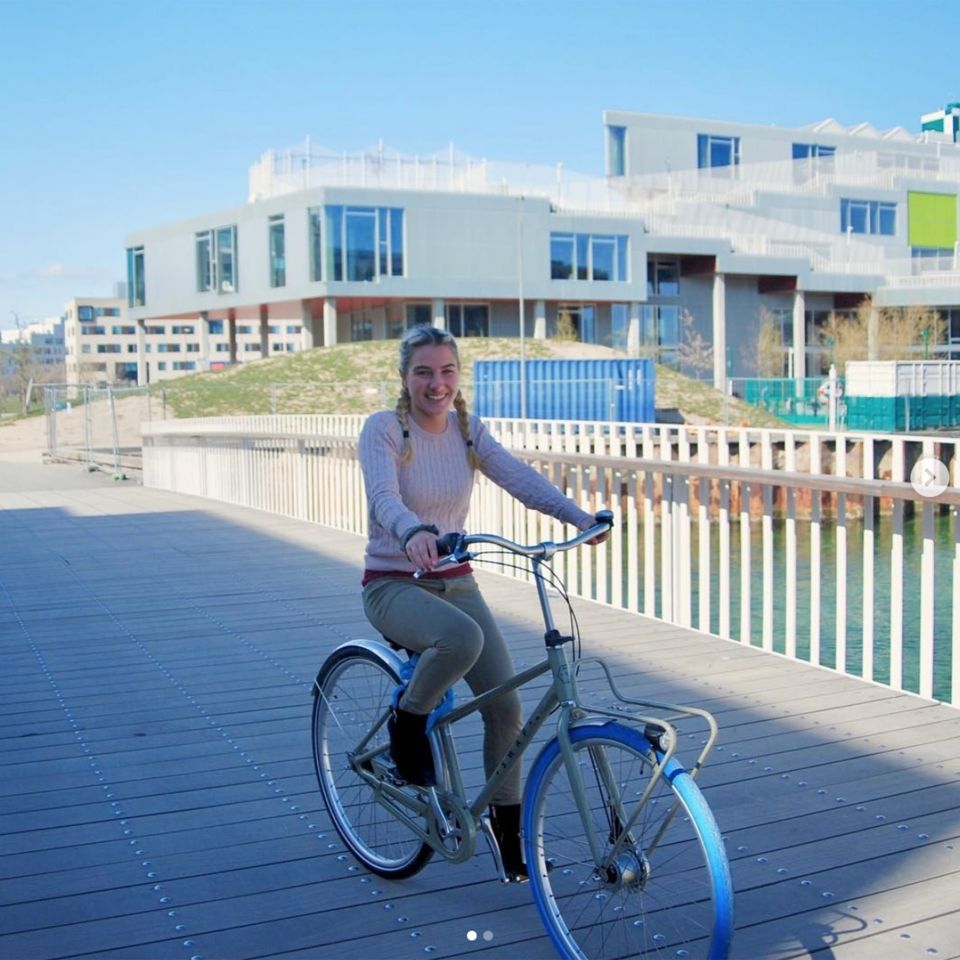
Read more: How to Prepare for Study Abroad: 10 Things You Need to Know
Study Abroad Essay Tips
The essay is an integral part of the CIEE study abroad application. Note a few of our study abroad essay tips to help you craft a meaningful narrative – you got this!
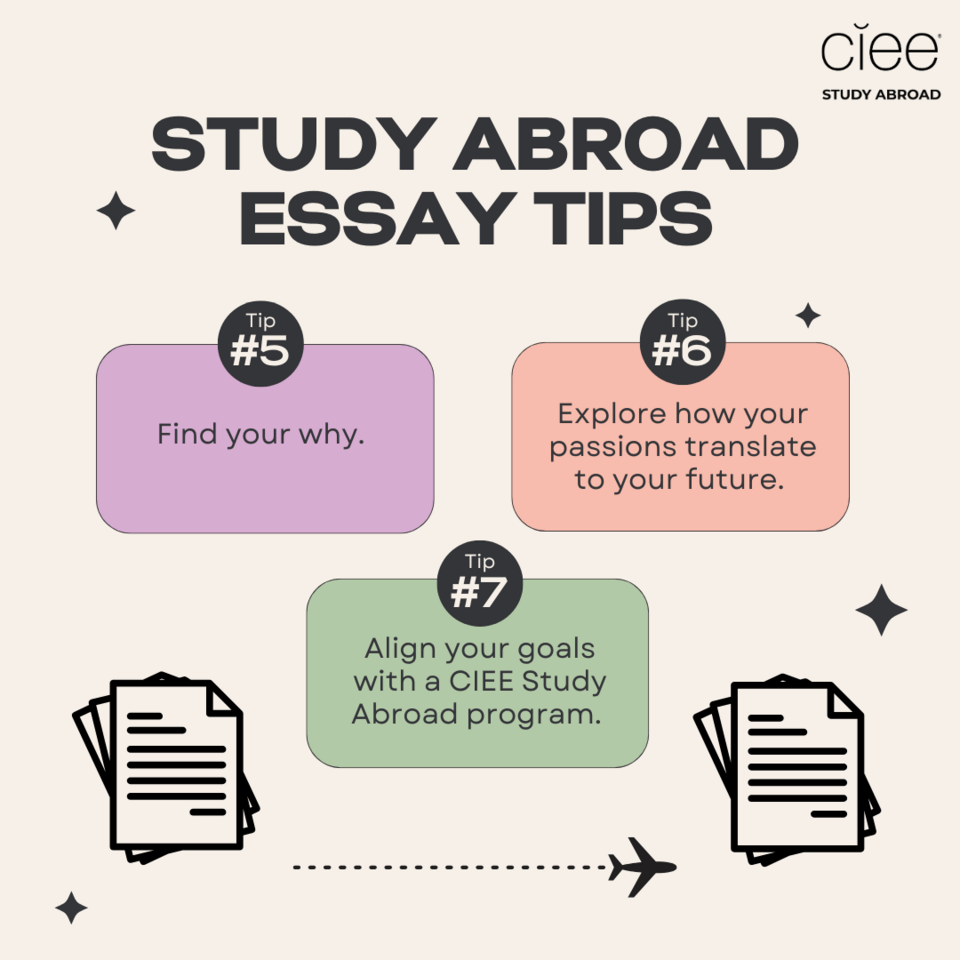
Read More: How Do I Write a Personal Statement for Study Abroad?
Tip #5: Find your why.
Before writing your study abroad essay, identify what you’re truly passionate about. Getting to know you and learning more about your interests is important when assessing study abroad applicants, and getting personal will help provide context about how a study abroad experience will benefit you.
Read More: What are Your Goals for Studying Abroad?
Tip #6: Explore how your passions translate to your future.
After identifying what you’re passionate about, discuss how you plan on practicing your interests in the future, either as a career or as a meaningful hobby. For example, you might have set your sights on continuing your education and learning more about a specific subject area.

Tip #7: Align your goals with a CIEE Study Abroad program.
This is where you put it all together: After detailing your passions and how you want to incorporate them into your future, pinpoint which CIEE study abroad program will help you fulfill your goals.
Read More: Why Study Abroad? Top 7 Benefits of Studying Abroad
Your study abroad essay is really a chance for us to get to know you and learn more about why a study abroad experience will enrich your personal, academic, and even career goals. Our study abroad essay tips will help you assemble your thoughts in one impactful piece!
Study Abroad Packing Tips
Before you jet off to your study abroad destination, you’ll want to know what to stuff in your suitcase. Let’s dive into some of our study abroad packing tips.
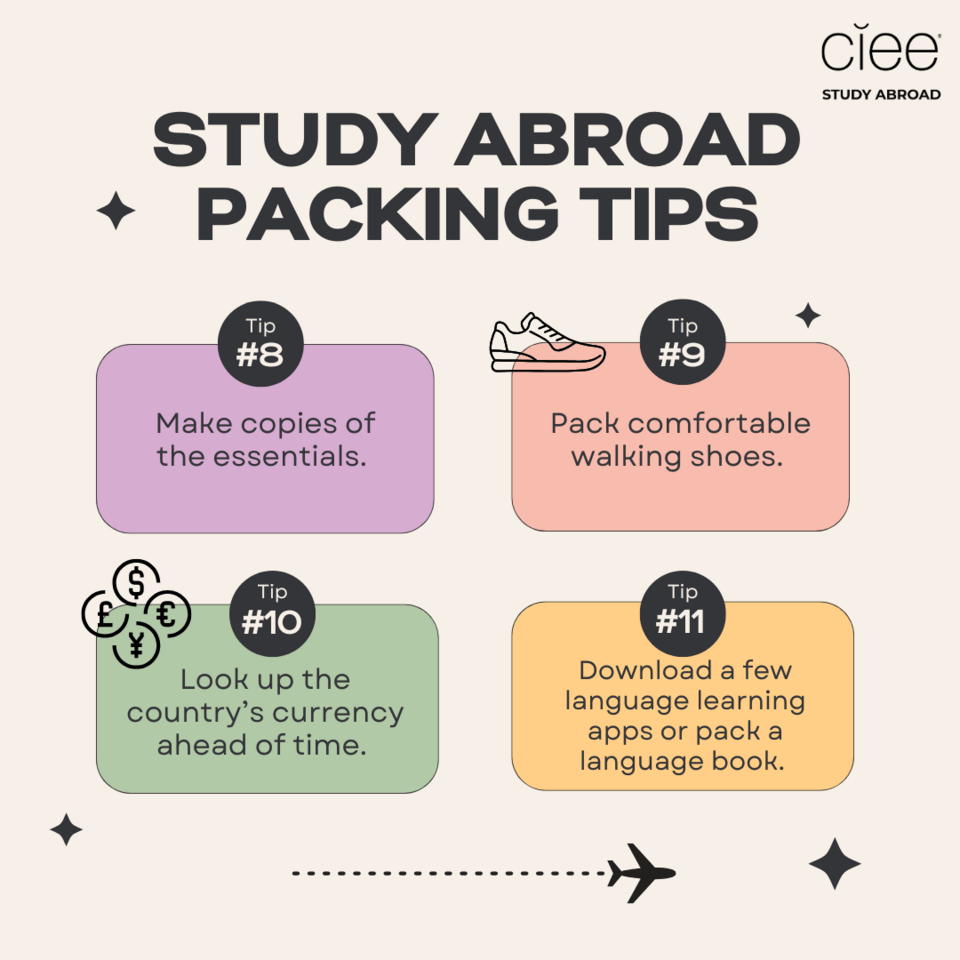
Read More: The Ultimate Guide to Your Study Abroad Packing List (10 Essential Items!)
Tip #8: Make copies of the essentials.
To be extra careful, it’s a good idea to make copies of your essential documents, like your passport, driver’s license, and travel insurance, before you go.
Tip #9: Pack comfortable walking shoes.
When you study abroad, you’re going to explore a lot. And that usually means walking nearly everywhere. That’s why one of our top study abroad packing tips is to include comfortable walking shoes to make your treks more enjoyable! Save your nicer pair of shoes for the occasional night out.

Tip #10: Look up the country’s currency ahead of time.
You’ll want to bring some cash along with you for souvenirs, a few meals out, and more. And that means converting your U.S. dollars to the currency available in your study abroad destination. A country’s currency is relatively easy to find online. For example, much of Europe uses the Euro, Japan uses the Japanese yen, and Australia uses the Australian dollar.
Tip #11: Download a few language learning apps or pack a language book.
While you’re not required to know the official language of your study abroad destination, it’s a smart idea to at least familiarize yourself with common words and phrases in the language that is widely spoken there so you can better communicate with locals and navigate your new international city while on program.
Try downloading a few language learning apps or including a language book in your packing list – this will go a long way!
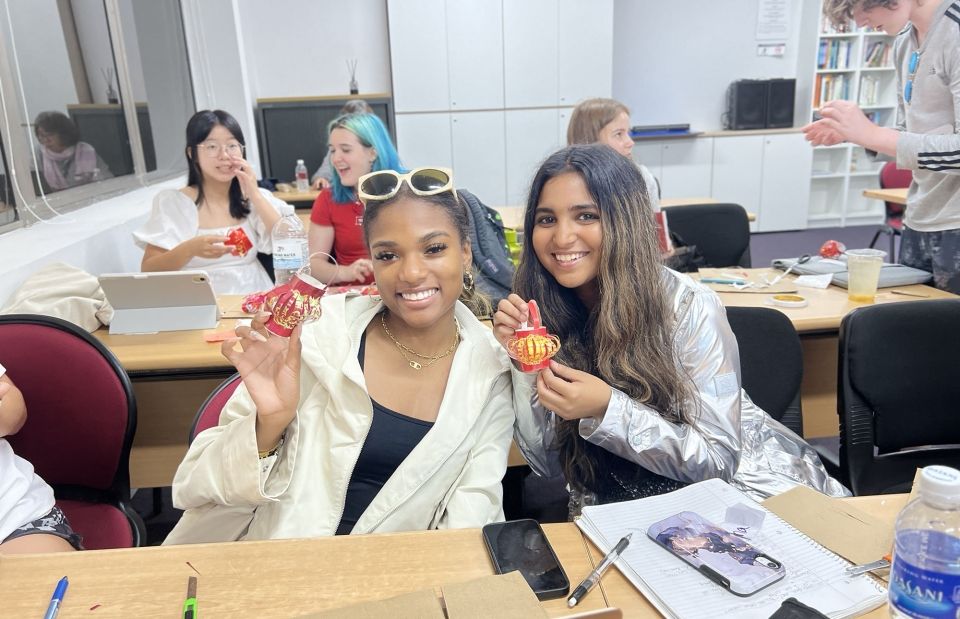
Study Abroad Safety Tips
Just like when you visit any new place, you want to be aware of your surroundings and follow any safety guidelines in an unfamiliar environment. The same goes for your study abroad program. While CIEE offers best-in-class safety and a 24/7 support team, it’s always smart to travel as safely as possible. Note a few of our study abroad safety tips here.
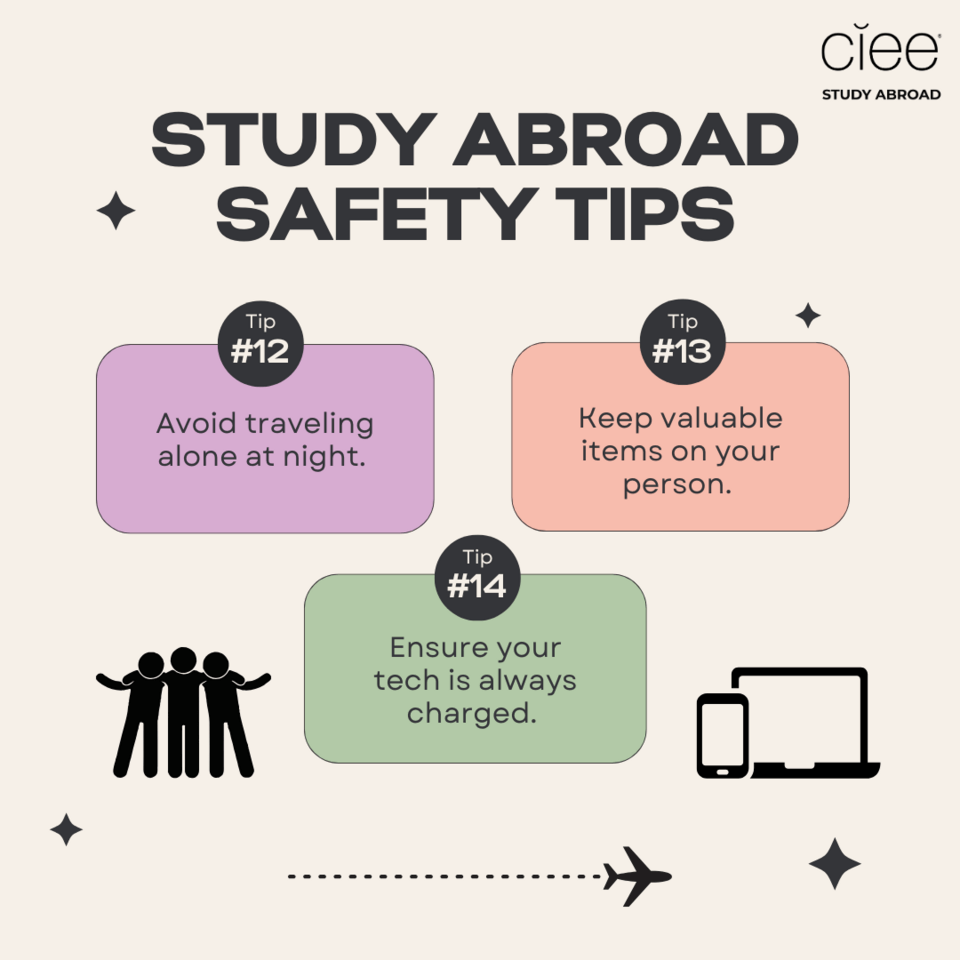
Tip #12: Avoid traveling alone at night.
No matter where you visit, it’s always best to avoid traveling alone at night. When you’re exploring after the sun sets, try tagging along with friends, or at the very least, let a few friends know where you’re going and what you’re up to.
Tip #13: Keep valuable items on your person.
When you’re adventuring throughout your study abroad location, it’s a good idea to keep valuable and important items, like your driver’s license or cash, in a secure location on your person – like a crossbody bag, fanny pack (also known as a waist pack), or backpack. You can even get a padlock. It’s always best practice, no matter where you are in the world, to keep valuable items close to you and in safe gear.
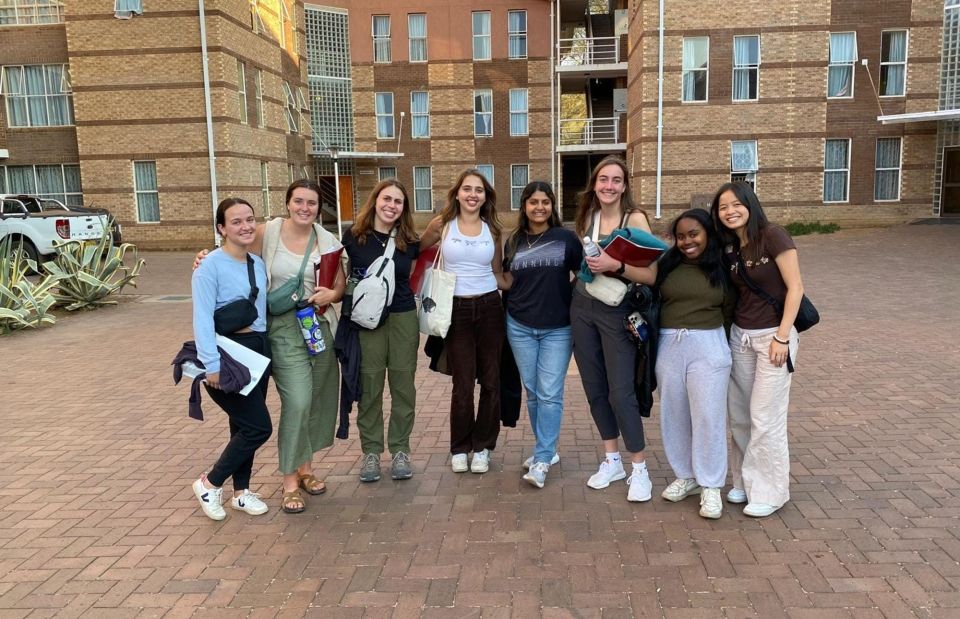
Tip #14: Ensure your tech is always charged.
Another vital thing to look up before your travels is which type of electrical outlets your new international city has. Y ’ll want to buy some converters to make sure you can charge your electronics, like your cellphone and laptop or tablet, in your new study abroad location.
And as a study abroad safety tip, it’s important to keep your tech charged at all times, just so you’ll always have a way of communicating with others, looking up directions if you get lost exploring, or researching available emergency contact numbers in your new city if ever needed.
Tips for Study Abroad on Program
We’ve compiled a few bonus study abroad tips, too – particularly for when you’re actually on your study abroad program!
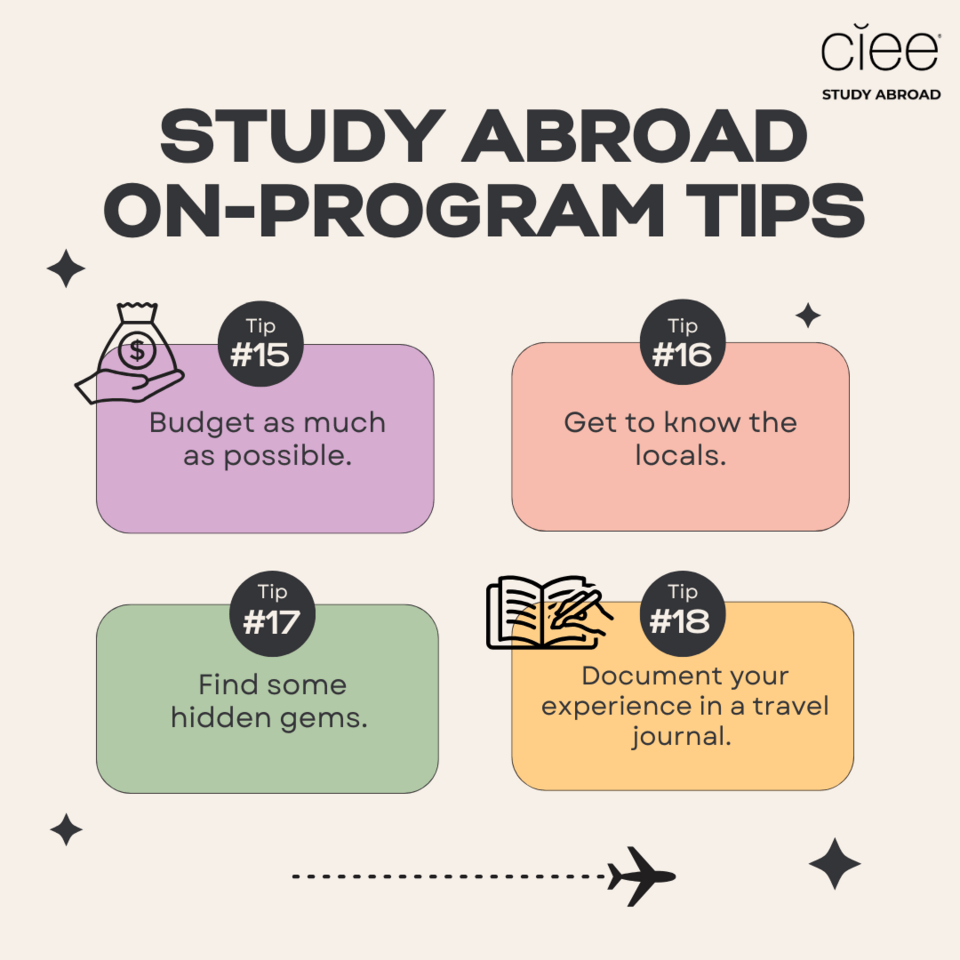
Tip #15: Budget as much as possible.
It’s easy to get swept up in the excitement of a study abroad program; trying delicious new restaurants, spending nights out, and visiting obscure museums with high fees might get out of hand quickly. Try to be mindful of your spending during your program and try to budget as much as possible.
Utilize the public transportation system in your new international city, grocery shop when you can and try making culturally authentic recipes at home, take advantage of any possible student discounts, and download apps like Ryanair for more affordable plane tickets. You can navigate your study abroad destination in a cost-effective way – it might just take some research ahead of time to find the best deals!
Read More: Budgeting Tips and How to Afford Studying Abroad
Tip #16: Get to know the locals.
Studying abroad is an authentic experience; you’ll get to meet people from all over the world and dive into new cultures. And a really great way to deepen your global perspective even further is by getting to know the locals.
When you find yourself out and about, start conversations with others respectfully and thoughtfully – you’ll learn more about their views and backgrounds, and most importantly, you’ll be making connections throughout the world.

Tip #17: Find some hidden gems.
In addition to the courses and cultural excursions in your CIEE program, when you live and study in a new place, you’ll get to do lots of exploring on your own. Try to find some lesser-known sites and attractions and uncover a few hidden gems during your study abroad adventure. It’ll make your experience even more exciting.
Tip #18: Document your experience in a travel journal.
Our last, but certainly not least, tip for studying abroad is to document your study abroad experience in a travel journal or similar log. Journaling your experience will serve as a pretty cool keepsake to look back on and help you reflect on and enrich your experience during your study abroad program. Include photos, postcards, and little mementos like receipts to make it fun!
Get on Your Way
Studying abroad is the experience of a lifetime, and following our study abroad tips and advice will help you better prepare and enjoy the experience that much more. Use these recommendations – no matter where you decide to travel – as study abroad Europe tips, study abroad Australia tips, and more!
Bon voyage!
Related Posts
4 Things I learned While Studying Abroad
By: Aja Tsutsumi Studying abroad is an exciting opportunity to explore the world and experience life in a foreign country but can also be very daunting! For many, study abroad... keep reading
What Are the Advantages and Disadvantages of Studying Abroad?
@cieestudyabroad These are the pros and cons of studying abroad! #cieestudyabroad #studyabroad #studyabroadadvice #studyabroadprograms #wheretostudyabroad #howtostudyabroad #college Sunshine - WIRA Studying abroad is a big decision. On the one hand... keep reading
Studying Abroad in London as an Arizona State University Student
By: Logan Alvarado CIEE allowed me to study abroad with so much flexibility! As a student at Arizona State University, I was able to study abroad and take classes online... keep reading


